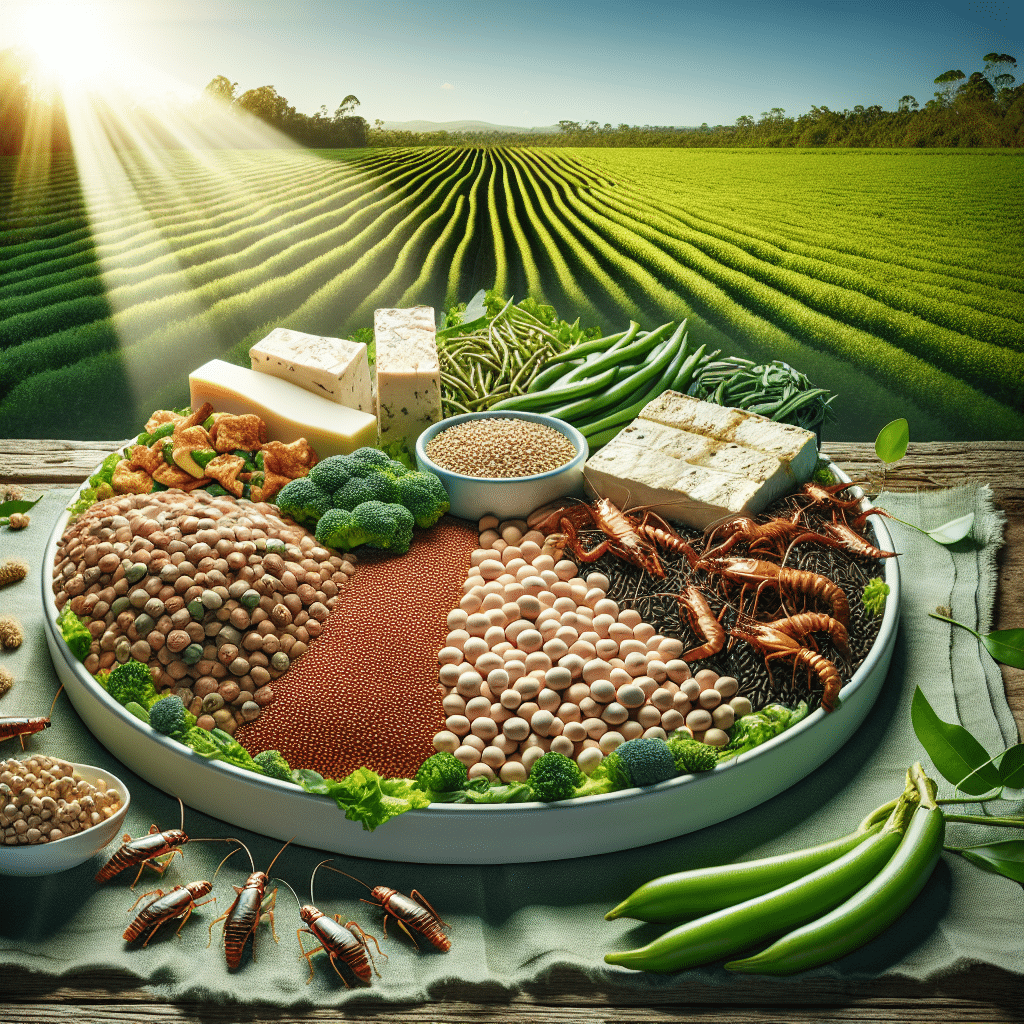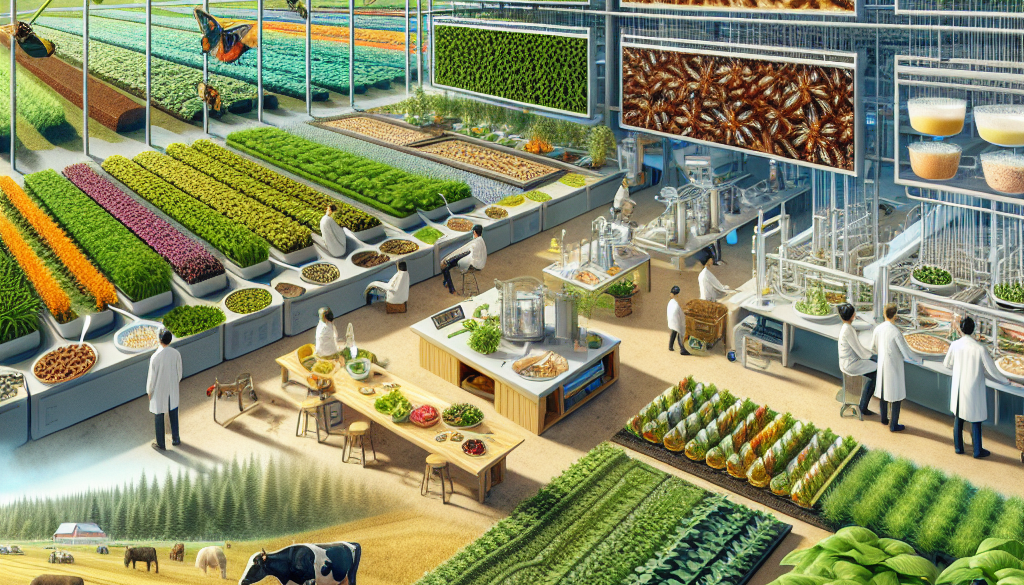Sustainable Protein Sources: Nourishing the Future
-
Table of Contents
- Sustainable Protein Sources: Nourishing the Future
- The Need for Sustainable Protein
- Plant-Based Proteins: A Green Revolution
- Insect Protein: The Tiny Giants
- Aquatic Proteins: The Blue Solution
- Lab-Grown Meat: The Future of Protein?
- Case Studies and Statistics
- Conclusion: Embracing Sustainable Proteins
- ETprotein: Your Partner in Sustainable Protein Solutions
Sustainable Protein Sources: Nourishing the Future

As the global population continues to grow, reaching a projected 9.7 billion by 2050, the demand for protein-rich foods is increasing at an unprecedented rate. Traditional sources of protein, such as meat and dairy, are resource-intensive and pose significant environmental challenges. The quest for sustainable protein sources has become a critical aspect of ensuring food security and environmental conservation. This article explores the various sustainable protein sources that are not only nourishing for the human body but also kind to our planet.
The Need for Sustainable Protein
Protein is a vital macronutrient required for building muscle, repairing tissue, and producing enzymes and hormones. However, the way we currently produce and consume protein is not sustainable. Livestock farming is one of the largest contributors to environmental degradation, leading to deforestation, water scarcity, and greenhouse gas emissions. As a result, there is an urgent need to shift towards more sustainable protein sources that can provide the necessary nutrients without the environmental toll.
Plant-Based Proteins: A Green Revolution
Plant-based proteins are at the forefront of the sustainable protein movement. They are derived from various plant sources and are associated with a lower environmental footprint compared to animal proteins. Here are some of the most promising plant-based proteins:
- Legumes: Beans, lentils, and chickpeas are excellent sources of protein and fiber. They fix nitrogen in the soil, reducing the need for chemical fertilizers.
- Nuts and Seeds: Almonds, chia seeds, and hemp seeds are not only protein-rich but also contain healthy fats and micronutrients.
- Whole Grains: Quinoa, buckwheat, and amaranth are complete proteins, meaning they contain all nine essential amino acids.
Plant-based proteins also come with health benefits, such as lower risks of heart disease, obesity, and certain types of cancer. Moreover, the innovation in plant-based meat alternatives has made it easier for consumers to adopt a plant-forward diet without compromising on taste or texture.
Insect Protein: The Tiny Giants
Insects are consumed by billions of people worldwide and are a highly nutritious and sustainable protein source. They require significantly less land, water, and feed compared to traditional livestock and emit fewer greenhouse gases. Edible insects like crickets, mealworms, and grasshoppers are rich in protein, vitamins, and minerals.
Several startups and companies are now producing insect-based snacks, flours, and protein powders, making it more accessible for consumers to incorporate insects into their diets.
Aquatic Proteins: The Blue Solution
Aquaculture, or fish farming, is another sustainable protein source when managed responsibly. It has a lower carbon footprint than beef and pork production and can be a source of omega-3 fatty acids. Sustainable aquaculture practices include:
- Choosing species that are low on the food chain, such as tilapia and carp.
- Implementing recirculating aquaculture systems (RAS) to reduce water usage and pollution.
- Using feed made from sustainable sources, such as algae and insect meal.
Seaweed and algae are also gaining attention as sustainable protein sources. They can be grown without freshwater or fertilizers and have the potential to sequester carbon dioxide.
Lab-Grown Meat: The Future of Protein?
Cultured meat, also known as lab-grown meat, is produced by cultivating animal cells in a lab. This process eliminates the need for raising and slaughtering animals, significantly reducing the environmental impact. While still in the early stages of commercialization, lab-grown meat has the potential to revolutionize the protein industry by providing a more ethical and sustainable way to produce animal protein.
Case Studies and Statistics
Several case studies highlight the potential of sustainable protein sources. For instance, companies like Beyond Meat and Impossible Foods have popularized plant-based burgers that closely mimic the taste and texture of beef. These products have seen a surge in demand, with Beyond Meat reporting a 36.6% increase in net revenues in 2020.
In the realm of insect protein, startups like Entomo Farms have reported a 50% year-over-year growth in their insect-based product sales, indicating a growing acceptance of insects as a viable protein source.
As for aquaculture, the World Bank projects that by 2030, nearly two-thirds of seafood will be farm-raised, emphasizing the importance of sustainable practices in this sector.
Conclusion: Embracing Sustainable Proteins
The transition to sustainable protein sources is not just an environmental imperative but also a necessity for human health and food security. By diversifying our protein sources and adopting more sustainable practices, we can nourish the future while preserving our planet. Consumers, producers, and policymakers must work together to support the growth of sustainable proteins and ensure they are accessible and affordable for all.
ETprotein: Your Partner in Sustainable Protein Solutions
If you’re looking for high-quality, sustainable protein options, ETprotein offers a range of organic bulk vegan protein and plant proteins that are perfect for your needs. Their products, including organic rice protein, clear rice protein, pea protein, and more, are non-GMO and allergen-free, making them suitable for a variety of applications.
ETprotein’s commitment to quality and sustainability makes them an ideal partner for businesses looking to incorporate sustainable proteins into their offerings. With a global reach and a reputation for excellence, ETprotein is poised to help you meet the growing demand for eco-friendly protein options.
About ETprotein:
ETprotein, a reputable protein Chinese factory manufacturer and supplier, is renowned for producing, stocking, exporting, and delivering the highest quality organic bulk vegan protein and plant proteins. They include Organic rice protein, clear rice protein, pea protein, clear pea protein, pumpkin seed protein, sunflower seed protein, mung bean protein, peanut protein etc. Their offerings, characterized by a neutral taste, non-GMO, allergen-free attributes, cater to a diverse range of industries. They serve nutraceutical, pharmaceutical, cosmeceutical, veterinary, as well as food and beverage finished product distributors, traders, and manufacturers across Europe, USA, Canada, Australia, Thailand, Japan, Korea, Brazil, and Chile, among others.
ETprotein specialization includes exporting and delivering tailor-made protein powder and finished nutritional supplements. Their extensive product range covers sectors like Food and Beverage, Sports Nutrition, Weight Management, Dietary Supplements, Health and Wellness Products, and Infant Formula, ensuring comprehensive solutions to meet all your protein needs.
As a trusted company by leading global food and beverage brands and Fortune 500 companies, ETprotein reinforces China’s reputation in the global arena. For more information or to sample their products, please contact them and email sales(at)ETprotein.com today.














